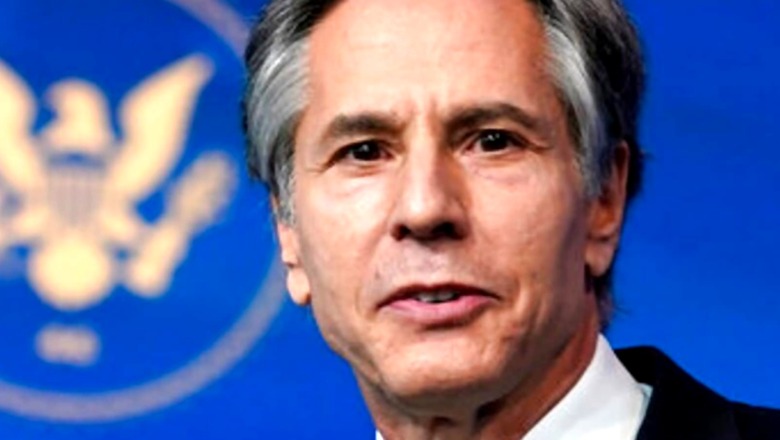
views
US Secretary of State Antony Blinken will arrive in India on a two-day visit on Tuesday with an extensive agenda featuring the rapidly evolving security situation in Afghanistan, boosting Indo-Pacific engagement and ways to enhance COVID-19 response efforts among others. It will be Blinken’s first visit to India after assuming charge as the US Secretary of State and the third by a high-ranking Biden administration official after it came to power in January.
US Defence Secretary Lloyd Austin visited India in March while US Special Envoy on Climate Change John Kerry travelled to New Delhi in April. Blinken is scheduled to meet External Affairs Minister S Jaishankar, National Security Advisor Ajit Doval and will call on Prime Minister Narendra Modi on Wednesday before leaving for Kuwait as part of his two-nation tour.
“Secretary Blinken’s visit is an opportunity to continue the high-level bilateral dialogue and bolster the India-US global strategic partnership,” the Ministry of External Affairs said last week while announcing the visit. “Both sides will review the robust and multifaceted India-US bilateral relations, and potential for consolidating them further,” it said.
What to Expect
Acting Assistant Secretary for South and Central Asian Affairs Dean Thompson said on Friday that the discussions will focus on expanding ties in areas of security, defence, cyber, and counterterrorism cooperation. “We collaborate across the government on these issues, including through regular US-India working group meetings, and we look forward to further strengthening our ties with India to ensure a safer and more secure world,” he said.
People familiar with the agenda of the visit said both sides will extensively deliberate on the deteriorating security situation in Afghanistan with the Taliban increasing its hostilities in an attempt to seize control of new areas in the country. Afghanistan witnessed a series of terror attacks in the last few weeks as the US withdrew the majority of its troops and is looking at completing the drawdown by August 31, ending nearly two decades of its military presence in the country.
The two sides are also expected to explore ways to deepen defence collaboration, including exercises, defence transfers and technologies ahead of the next edition of the 2+2 defence and foreign ministerial dialogue to be held in the US later this year, they said. Both sides will also discuss ways to deepening engagement in the Indo-Pacific region as well as in enhancing COVID-19 response efforts.
The two sides are also expected to look at implementing the Quad vaccine initiative. They are also expected to focus on ways to augment trade and investment ties, besides looking at opportunities in healthcare, education, digital domains, the people cited above said.
In the talks, India will continue to push for ensuring open and consistent supply chains for materials and items required for vaccine production, the people cited above said. Boosting defence and strategic ties is expected to also figure in the talks.
Tracing Indo-US Defence Ties
The Indo-US defence ties have been on an upswing in the last few years. In June 2016, the US had designated India a “Major Defence Partner”. The two countries have also inked key defence and security pacts over the past few years, including the Logistics Exchange Memorandum of Agreement (LEMOA) in 2016 that allows their militaries to use each other’s bases for repair and replenishment of supplies as well as provides for deeper cooperation.
The two sides have also signed COMCASA (Communications Compatibility and Security Agreement) in 2018 that provides for interoperability between the two militaries and provides for the sale of high-end technology from the US to India. In October last year, India and the US sealed the BECA (Basic Exchange and Cooperation Agreement) to further boost bilateral defence ties. The pact provides for sharing of high-end military technology, logistics and geospatial maps between the two countries.
coinciding with his government completing two years in office. He termed these two years as “trial by fire”, pointing out that he had to run the administration without cabinet in the initial days, followed by devastating floods and the challenge of Covid-19 management, among other issues.
The 78-year-old BJP veteran who submitted his resignation to Governor Thaawarchand Gehlot at the Raj Bhavan here, said he quit “voluntarily”. “I had decided to resign two months ago, as we complete two years of our government today. I thought it was apt to resign now and have submitted the resignation to the Governor, and he has accepted it,” Yediyurappa told reporters emerging from the Raj Bhavan.
Read all the Latest News, Breaking News and Coronavirus News here.




















Comments
0 comment